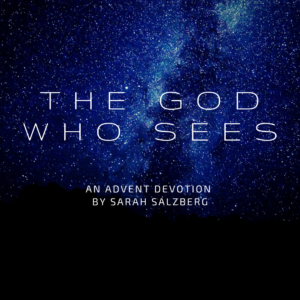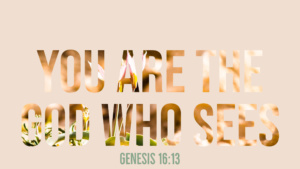 During the seasons of Advent and Christmas, names and their meanings seem to take on a special significance. The angel’s words to Joseph, “you are to give him the name Jesus, because he will save his people from their sins.” The fulfillment of Isaiah’s proclamation, “The virgin will conceive and give birth to a son, and they will call him Immanuel” (which means “God with us”). The iconic promise, “For to us a child is born, to us a son is given, and the government will be on his shoulders. And he will be called Wonderful Counselor, Mighty God, Everlasting Father, Prince of Peace.”
During the seasons of Advent and Christmas, names and their meanings seem to take on a special significance. The angel’s words to Joseph, “you are to give him the name Jesus, because he will save his people from their sins.” The fulfillment of Isaiah’s proclamation, “The virgin will conceive and give birth to a son, and they will call him Immanuel” (which means “God with us”). The iconic promise, “For to us a child is born, to us a son is given, and the government will be on his shoulders. And he will be called Wonderful Counselor, Mighty God, Everlasting Father, Prince of Peace.”
In my family, names have held a similar significance. My siblings and I were given our names specifically to reflect our Biblical counterparts. Naturally then, I was drawn to the story of Sarah in the Bible, after all, she’s my namesake. The name means “princess,” so what’s not to like? Initially, I just liked that she was the wife of Abraham and mother of Isaac and seemed pretty important and was, apparently, extremely attractive.
Gradually, I came to empathize with the story where Abraham forces her to submit to Pharaoh in order to save his own life. But honestly, I avoided her story with Hagar because it always felt like she might be the bad guy in that one, and it was easier to deny than to confront my namesake. But here it is from Genesis 16:1-6:
Now Sarai, Abram’s wife, had borne him no children. But she had an Egyptian slave named Hagar; so she said to Abram, “The Lord has kept me from having children. Go, sleep with my slave; perhaps I can build a family through her.”
Abram agreed to what Sarai said. So after Abram had been living in Canaan ten years, Sarai his wife took her Egyptian slave Hagar and gave her to her husband to be his wife. He slept with Hagar, and she conceived.
When she knew she was pregnant, she began to despise her mistress. Then Sarai said to Abram, “You are responsible for the wrong I am suffering. I put my slave in your arms, and now that she knows she is pregnant, she despises me. May the Lord judge between you and me.”
“Your slave is in your hands,” Abram said. “Do with her whatever you think best.” Then Sarai mistreated Hagar; so she fled from her.
That’s my namesake. That’s me? Did Sarah not remember what it was like to be the one used and abused? It pleased her to harass and abuse a pregnant woman so much to drive her into the wilderness? This “princess” chooses to rule in a way that benefits herself at the cost of another person’s life. That’s probably why in my subconscious, and even fully conscious, brain, I simply avoided this story.
I can empathize with Sarah here, too. In my rule as “princess” – out of jealousy, disdain for my own shortcomings, fear for my financial well-being – I have chosen to guard and protect myself, knowing full well how much I am prioritizing myself over everyone else. It is during this season of Advent and Christmas that I need to hear this story because it is yet another account that mirrors our temptation as found in the garden of Genesis 3. She saw. She took. She gave.
While I would love to place this story in antiquity and leave us all out of it, the reality is, I am no different and neither are you. When left to our own devices, when given the choice to do whatever we think best, we mistreat and bring fear.
Thank God that’s not how the story ends. Genesis 16:7-10, 13 records:
The angel of the Lord found Hagar near a spring in the desert; it was the spring that is beside the road to Shur. And he said, “Hagar, slave of Sarai, where have you come from, and where are you going?”
“I’m running away from my mistress Sarai,” she answered.
Then the angel of the Lord told her, “Go back to your mistress and submit to her.” The angel added, “I will increase your descendants so much that they will be too numerous to count.”
She gave this name to the Lord who spoke to her: “You are the God who sees me,” for she said, “I have now seen the One who sees me.”
 Hagar’s name means “stranger/immigrant” and that’s literally who she was. Honestly, what Sarah did to Hagar was not much out of line with the rest of the Ancient Near East world at the time. But Yahweh is not like the gods of Egypt or Assyria. He is a God who sees the immigrant and the stranger, the exiled. So, here, God steps into the human experience and cares for Hagar. He provides for her in word and action. He sees Hagar and serves her.
Hagar’s name means “stranger/immigrant” and that’s literally who she was. Honestly, what Sarah did to Hagar was not much out of line with the rest of the Ancient Near East world at the time. But Yahweh is not like the gods of Egypt or Assyria. He is a God who sees the immigrant and the stranger, the exiled. So, here, God steps into the human experience and cares for Hagar. He provides for her in word and action. He sees Hagar and serves her.
How beautiful that even God is given a name that fits His character, “I have seen Him who sees me.” Hagar worshipped the God who Sees. What would it look like to be one who worships the God who Sees? What would it look like for the Church to proclaim the God who Sees? May we see those who are used, abused, outsiders, strangers, lonely, abandoned, and may we serve them with the love of God.
How beautiful that even God is given a name that fits His character, “I have seen Him who sees me.” Hagar worshipped the God who Sees. What would it look like for the Church to proclaim the God who Sees? May we see those who are used, abused, outsiders, strangers, lonely, abandoned, and may we serve them with the love of God.
Imagine Sarah’s face when she saw Hagar returning. We’re not told exactly how Yahweh revealed it to Sarah, but He explicitly tasked her with providing for Hagar. What a God of grace who sees Sarah, too! Yahweh also sees us in our destructive brokenness and continues to love us and task us with the love of our neighbor.
As you prepare for Christmas and reflect on Christ’s entrance into the human experience as a baby, consider what it means that we worship the God who Sees. As John writes in his gospel:
And the Word became flesh and dwelt among us, and we have seen his glory, glory as of the only Son from the Father, full of grace and truth. For from his fullness we have all received, grace upon grace. No one has ever seen God; the only God, who is at the Father’s side, he has made him known. (John 1:14, 16, 18)
Christ sees you. He sees you in need like Hagar and He sees you in your destructive brokenness like Sarah. And when Christ sees, He is moved to action. He takes on flesh and provides grace upon grace. May He grant you His eyes to see where His Spirit moves you to action, that others may see the cross of Christ and His empty tomb and boldly proclaim, “I have seen the One who sees me.”
 Sarah Salzberg lives in Los Angeles, CA with her husband (Josh), son (Hosea) and daughter (Simone), traveling from one coffee shop to another trying as many cappuccinos and croissants as she can. When not hopped up on espresso, Sarah teaches Old Testament at Orange Lutheran High School in Orange County, CA. In addition, she has served as a planner and theological advisor for the LCMS Youth Gathering as well as a speaker for youth and women’s retreats around the country. She earned her master’s degree in Theology from Concordia University in Irvine, but her pride and joy will always be Concordia Seward where she earned her Bachelor’s in Education. As mundane as it sounds, she’s living the dream!
Sarah Salzberg lives in Los Angeles, CA with her husband (Josh), son (Hosea) and daughter (Simone), traveling from one coffee shop to another trying as many cappuccinos and croissants as she can. When not hopped up on espresso, Sarah teaches Old Testament at Orange Lutheran High School in Orange County, CA. In addition, she has served as a planner and theological advisor for the LCMS Youth Gathering as well as a speaker for youth and women’s retreats around the country. She earned her master’s degree in Theology from Concordia University in Irvine, but her pride and joy will always be Concordia Seward where she earned her Bachelor’s in Education. As mundane as it sounds, she’s living the dream!


